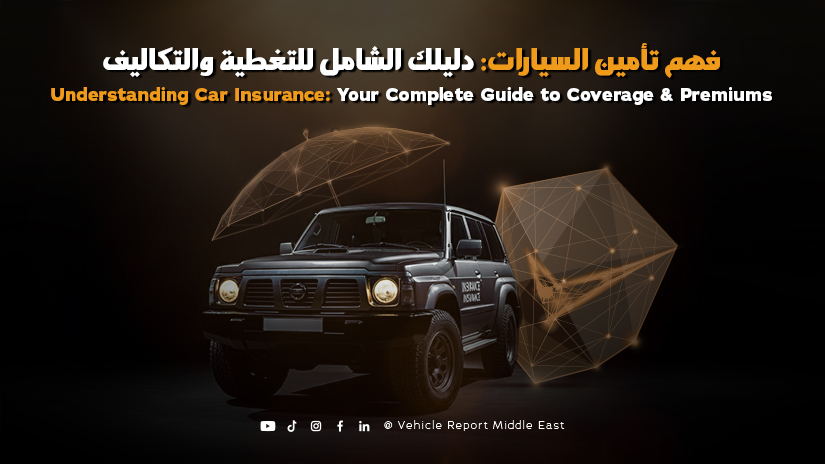Understanding Car Insurance in the UAE: A Complete Guide to Coverage & Premiums

Understanding Car Insurance in the UAE: A Comprehensive Guide
Car insurance in the UAE is not just a legal requirement—it's a crucial safeguard for you, your vehicle, and other road users. With a bustling automotive market and a mix of new and seasoned drivers, understanding the intricacies of car insurance is essential.
This comprehensive guide aims to demystify the different types of car insurance available in the UAE, explain mandatory and optional coverages, and provide actionable tips on choosing the right policy.
We'll also delve into common pitfalls to avoid and highlight the importance of a vehicle history report in securing the best insurance rates.
Mandatory Car Insurance in the UAE
Third-Party Liability Insurance
In the UAE, third-party liability insurance is the minimum legal requirement for all vehicle owners. This type of insurance covers damages or injuries you cause to others in an accident. It ensures that victims receive due compensation, promoting accountability and financial responsibility among drivers.
According to the UAE Government Portal on Vehicle Insurance, third-party insurance is designed to protect other road users from losses you might inflict. However, it's important to note that this insurance does not cover any damages to your own vehicle or any injuries you might sustain.
Limitations of Third-Party Insurance
While third-party insurance fulfills legal obligations, it offers limited protection. If you're involved in an accident where you're at fault, you'll bear the cost of repairing your vehicle out of pocket. Medical expenses for you and your passengers also aren't covered. This limitation underscores the importance of considering whether third-party insurance alone is sufficient for your needs.
Optional Car Insurance Coverages
To enhance protection and peace of mind, many drivers opt for additional insurance coverages beyond the mandatory third-party liability.
Comprehensive Insurance
Comprehensive insurance provides extensive coverage that includes damages to your own vehicle as well as third-party liabilities. It covers a wide range of incidents such as accidents, theft, fire, and natural disasters. The Roads and Transport Authority (RTA) Dubai recommends comprehensive insurance for drivers seeking broader protection.
Benefits of Comprehensive Insurance
- Own Vehicle Coverage: Protects against repair or replacement costs for your vehicle due to accidents or other covered events.
- Third-Party Coverage: Includes all benefits of third-party liability insurance.
- Personal Accident Cover: May cover medical expenses for injuries sustained by you or your passengers.
- Additional Perks: Often includes benefits like roadside assistance and agency repairs.
Considerations
While comprehensive insurance provides extensive coverage, it comes with higher premiums compared to third-party insurance. It's essential to read the policy details carefully to understand the inclusions, exclusions, and any deductibles that may apply.
Additional Optional Coverages
Beyond comprehensive insurance, insurers offer various add-ons to tailor your policy to your specific needs:
- Agency Repairs: Ensures your vehicle is repaired at the manufacturer's authorized service centers, using genuine parts and adhering to high-quality standards.
- Roadside Assistance: Provides services such as towing, battery jump-starts, fuel delivery, and flat tire assistance, offering peace of mind during unexpected breakdowns.
- No-Claims Discount Protection: Safeguards your accumulated no-claims discount even if you make a claim, helping you save on future premiums.
How to Choose the Right Insurance Plan
Selecting the right car insurance involves more than just picking the cheapest option. It requires a thorough assessment of your needs and careful comparison of available policies.
Assess Your Needs
- Vehicle Value: If you own a new or high-value car, comprehensive insurance can protect your significant investment.
- Driving Habits: Consider how often and where you drive. Frequent long-distance driving or navigating through high-traffic areas may increase your risk of accidents.
- Financial Capacity: Determine what you can afford in terms of premiums and potential out-of-pocket expenses in case of a claim.
Compare Multiple Quotes
- Premium Costs: Obtain quotes from multiple insurers to compare prices.
- Coverage Details: Ensure that the policies offer the coverage you need.
- Exclusions and Deductibles: Be aware of what's not covered and the costs you may incur when making a claim.
- Reputation of Insurers: Research customer reviews and claim settlement ratios to gauge the reliability of insurers.
Understand Policy Terms
- Inclusions: Know exactly what events and damages are covered.
- Exclusions: Be aware of situations where the insurer will not provide coverage.
- Claims Process: Understand the procedure for filing a claim and the required documentation.
- Renewal Terms: Check if the premiums or coverage change upon renewal.
Common Pitfalls to Avoid
Being aware of common mistakes can help you avoid issues down the line.
Overlooking Policy Exclusions
One significant pitfall is ignoring the exclusions listed in your policy. Common exclusions may include:
- Driving Under the Influence: Claims may be denied if you were intoxicated at the time of the accident.
- Unauthorized Modifications: If you've made modifications to your vehicle without informing the insurer, your claim may be rejected.
- Unlicensed Driving: Operating the vehicle without a valid license can void your insurance coverage.
Always read the fine print to understand what is and isn't covered.
Providing Inaccurate Information
Honesty is vital when applying for insurance. Providing false or incomplete information can result in claim denial or policy cancellation. Ensure that you:
- Disclose Full Vehicle History: Include any previous accidents or major repairs.
- Provide Accurate Personal Details: Supply correct information about your age, driving experience, and residence.
Ignoring the Vehicle's History
The history of your vehicle significantly impacts your insurance premiums. Vehicles with a history of accidents, extensive repairs, or modifications may attract higher premiums due to the increased risk they pose.
Importance of a Vehicle History Report
Obtaining a comprehensive vehicle history report is crucial for:
- Transparency with Insurers: Providing accurate information can prevent claim denials.
- Negotiating Better Rates: A clean history can help you secure lower premiums.
- Making Informed Decisions: Understanding the vehicle's past can influence your coverage needs.
Access a detailed vehicle history report from Vehicle Report to gain insights into your car's background.
The Role of Vehicle History in Insurance Premiums
How Insurers Use Vehicle History
- Accident History: Past accidents may indicate a higher likelihood of future claims.
- Repair Quality: Previous repairs, especially if not done by authorized centers, may affect the vehicle's safety.
- Usage Patterns: High mileage or commercial use can impact the risk assessment.
Benefits of Using Vehicle Report
- Ensure Accurate Premiums: Avoid overpaying due to incorrect assumptions about your vehicle.
- Build Trust with Insurers: Demonstrate transparency, which can facilitate smoother claims processes.
- Make Informed Choices: Decide on necessary coverages based on your vehicle's history.
Visit Vehicle Report's VIN Check page to access comprehensive information about your vehicle.
Tips for Reducing Insurance Premiums
Lowering your insurance premiums doesn't necessarily mean compromising on coverage. Here are some strategies:
Maintain a Clean Driving Record
Safe driving habits can earn you a no-claims discount over time. Insurers reward drivers who haven't made claims, reflecting their lower risk.
Install Safety and Security Features
Equipping your car with anti-theft devices, GPS trackers, and advanced safety systems can reduce the risk of theft or accidents, leading to lower premiums.
Opt for Higher Deductibles
Choosing a higher deductible—the amount you pay out of pocket before insurance covers the rest—can lower your premium. Ensure the deductible is affordable in case you need to make a claim.
Bundle Insurance Policies
If you require multiple insurance products, such as home or health insurance, consider bundling them with the same provider. Insurers often offer discounts for multiple policies.
Conclusion
Understanding car insurance in the UAE empowers you to make informed decisions that protect you financially and legally. By comprehending the differences between mandatory and optional coverages, assessing your needs, and being aware of common pitfalls, you can select an insurance policy that offers the best protection. Utilizing resources like Vehicle Report for your vehicle history ensures transparency and can help secure better insurance rates.
Remember, the right insurance policy isn't just about compliance—it's about peace of mind on the road. Take the time to research, ask questions, and choose wisely.



 Understand real market value
Understand real market value Get complete vehicle history
Get complete vehicle history View key information at a glance
View key information at a glance
 Facebook
Facebook LinkedIn
LinkedIn YouTube
YouTube Instagram
Instagram TikTok
TikTok Visa
Visa Mastercard
Mastercard  Apple Pay
Apple Pay 



